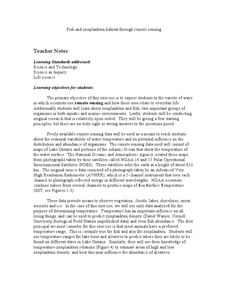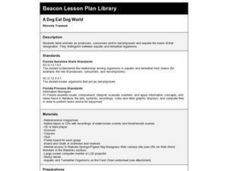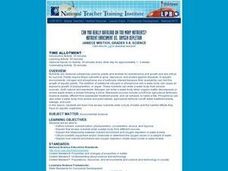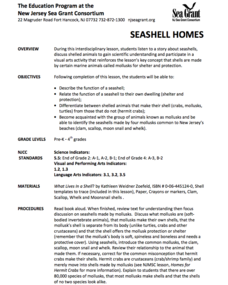California Academy of Science
Carbon Cycle Role Play
Anytime you make concepts clear with role playing or hands-on experience, it's a win for the whole class. Ping-Pong balls are used to represent carbon in a carbon cycle role-play activity. In small groups, children first discuss what...
Teach Engineering
The Great Pacific Garbage Patch
The Great Pacific Garbage Patch is one of several garbage patches around the world where garbage accumulates naturally. As part of a GIS unit that combines oceanography, environmental science, and life science, class members investigate...
Chicago Botanic Garden
Food for Thought: Climate Change and Trophic Cascades
Learners examines the arctic food web with a short video about polar bears and an article about bears and warming temperatures. They design an arctic food web and discuss the trophic cascade that could come from climate change.
Curated OER
Wetland Metaphors
Students describe the characteristics of wetlands and identify their ecological functions. They inspect items and use them to create metaphors about wetlands.
Curated OER
WET Science Lesson #5: Pass the Salt Please! (How Road Salt Affects Wetlands)
As an anticipatory set, biologists listen to the story of Ruth Patrick, a scientist who used algae to detect water quality. They observe a demonstration of osmosis and diffusion. In their lab groups, they place Elodea stalks in...
Curated OER
Fish and Zooplankton Through Remote Sensing
Ecology aces examine sea surface temperature maps and relate temperatures to concentration in fish and zooplankton populations. Take your class to a computer lab and provide experience with actual remote sensing data. Some of the links...
Georgia Aquarium
The Ocean's Nursery
Linear perspective, estuaries, and water ways converge in a science-inspired art project. The class uses what they've learned about eco-systems, estuaries, and the food chain to create scale models of a local marsh. While the lesson is...
Biology Junction
Amphibians
Biologists know of more than 2,300 living species of amphibians. Learn more about the four orders of amphibians with an interesting presentation. It explains the similarities and differences between the thousands of species of...
Learning Games Lab
Nitrogen in Pollutants
Responsible farming is important for maintaining natural resources. Eager scientists complete a WebQuest to explore what happens to nitrogen when it enters the soil. They learn about the chemical makeup of nitrogen-based molecules and...
Curated OER
Cytoplasmic Streaming
Students prepare successful wet mount slide of Elodea. They determine and identify environmental conditions that induce cytoplasmic streaming. They determine the positive aspects of cytoplasmic streaming. They illustrate knowledge and...
Curated OER
A Dog Eat Dog World
Fourth graders distinguish between acquatic and terrestrial organisms. They label animals as producers, consumers, and/or decomposers.
Curated OER
Mollusks
In this mollusks worksheet, students will review the characteristics of the three major classes of mollusks: gastropods, bivalves, and cephalopods. This worksheet has 17 matching, 6 short answer, 9 fill in the blank, and 4 true or false...
Curated OER
Nutrient Enrichment vs. Oxygen Depletion
Learners investigate how excess nutrients enter a body of water, and the harmful effects they have on aquatic organisms.
Curated OER
Mighty Macroinvertebrates
Seventh graders identify the names and features of macroinvertebrates found in Turtle River. In this ecology lesson students use digital microscopes and take pictures of invertebrates.
Curated OER
Flatworms
In this flatworms worksheet, students will review the characteristics of planarians, tapeworms, and flukes. This worksheet has 5 true or false, 2 short answer, and 7 matching questions.
Curated OER
What A Tangled Web We Weave
Learners of many ages discuss how all organisms rely on other organisms for their survival. They construct a food web and energy pyramids, and write an informative essay about the food web that they have designed.
Curated OER
Study of Animals
Third graders use the internet to research about an animal. After watching a demonstration, they follow the same steps to gain access to the internet as their teacher and find a picture of their animal to print. They complete a worksheet...
Curated OER
The Hudson's Ups and Downs
Even rivers have tides. Older elementary schoolers will discuss the Hudson River and how weather, water craft, and the ocean cause tidal fluctuation. They will examine a series of line graphs that depict tidal fluctuation, then analyze...
Curated OER
Bye-Bye Trout Song
Students develop an understanding about what will happen to trout after they are released into the trout stream. In this trout life lesson, students discuss how it feels to release the trout they have cared for. Students also sing a song...
Curated OER
Plant Structure and Growth
This plant structure and function PowerPoint addresses the main organs and the factors that affect its development as well as going into detail about the specializations at a cellular level. The cell functions and system adaptations...
Curated OER
Speedy Succession
Fifth graders investigate how a pond ecosystem can change into a prairie or grassland ecosystem. They observe a small pond ecosystem in a two liter soda bottle, and examine and record changes over a two-week period of time on a worksheet.
Curated OER
Forest In A Jar
Tenth graders are introduced to the process of succession and gain awareness of the changing nature of ecosystems. They demonstrate a comprehension of the dynamic nature of ecosystems, including the relationship between ecological...
Curated OER
The Wetlands
Fourth graders learn what a wetland is, where they can be found, and what types of plants, animals and characteristic are associated with the wetlands. They also participate in an activity to explore and enhance their knowledge of...
Curated OER
Seashell Homes
Pupils listen to a story about seashells. They discuss shelled animals. Learners describe the function of seashell. Pupils relate the function of a seashell to their own dwelling. They differentiate between shelled animals that make...

























